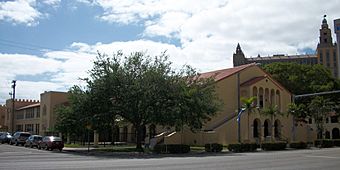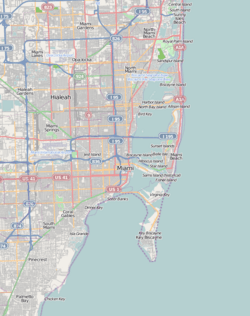Coral Gables Preparatory Academy facts for kids
Quick facts for kids |
|
|
Coral Gables Elementary School
|
|

Coral Gables Preparatory Academy in Coral Gables, Florida, April 2010
|
|
| Location | 105 Minorca Ave., Coral Gables, Florida |
|---|---|
| Architect | Richard Kiehnel |
| Architectural style | Mission/Spanish Revival |
| NRHP reference No. | 88000750 |
| Added to NRHP | June 30, 1988 |
Coral Gables Preparatory Academy is a public school in Coral Gables, Florida. It teaches students from kindergarten all the way through 8th grade. This school used to be called Coral Gables Elementary School.
The school is part of the Miami-Dade County Public Schools system. Younger students (elementary grades) attend classes in the Lower Academy. This building is the original Coral Gables Elementary building. Older students (middle school grades) go to the Upper Academy. This part is located at the Merrick Educational Center. The school got its current name in 2010.
The Lower Academy building is a very old and important school building. It was designed by a famous architect named Richard Kiehnel. You can find it at 105 Minorca Avenue. Because of its history and design, it was added to the U.S. National Register of Historic Places on June 30, 1988.
Contents
School History
Early Years: Opening and Growth
Coral Gables Elementary School first opened in October 1923. Back then, it was called Coral Gables Grammar School. It started with only 39 students and one teacher, Mary Feaster Jackson. George E. Merrick, who founded Coral Gables, paid for the school to be built. He believed that "beautiful things inspire higher ideals in the minds of children."
So, he hired a well-known architectural firm, Kiehnel & Elliott. They designed the school in a beautiful Spanish colonial style. By 1926, the school had grown a lot, with about 1,000 students. In 1982, the city of Coral Gables recognized the school as a "City of Coral Gables Landmark." It was also placed on the National Register of Historic Places because of its important role in the city's history.
School Leaders and Programs
Abigail Gilday became the school's first long-term principal in 1927. She led the school until 1945. During her time, Coral Gables Elementary became the first school in the country to start a Cub Scouts Troop in 1934. They also launched the Boy Patrol Program that same year.
In 1945, Bertha Webb became the second principal. She served for 16 years until 1961. During World War II, students at the school helped sell war bonds and stamps. They sold over $300,000 worth! For their amazing effort, they won an award from the U.S. Department of the Treasury.
Jack Jaimeison was the third principal, from 1961 to 1971. He helped the school start its first Science Fair. He also focused on technology and community projects. A big change during his time was the process of desegregation. This meant bringing students of all races together in schools.
Bringing Students Together
In 1970, a judge ruled that all schools in Miami-Dade County needed to be integrated. In 1971, Coral Gables Elementary was paired with Carver Elementary. This plan meant that first and second graders would go to Carver. Students in third through sixth grade would attend Coral Gables Elementary.
At first, some parents had concerns about this plan. Principal Jaimeison held meetings for parents to share their thoughts. Because of these discussions, the plan was adjusted. With help from parents and community leaders, the partnership worked well. The schools began the pairing program in the fall of 1971.
George E. Bowker became the fourth principal in 1971. He led the school until his retirement in 1991. During his time, the school was named a Historic Landmark in 1982. It was also added to the U.S. National Register of Historic Places in 1988. In 1989, the school received the Golden School Award for Volunteerism. This award recognized the many volunteers who helped the school.
Dr. Melanie Revman Fox was the fifth principal, from 1991 to 2003. In 1992, after Hurricane Andrew caused a lot of damage, the school helped many families from Homestead. The school continued its partnership with Carver Elementary. Later, a "controlled choice" system was introduced. This allowed parents to choose from a few schools in the area through a lottery. In 1993, the school earned the National Blue Ribbon School of Excellence award. In 1999, it was rated an 'A' school.
Modern Era: Expanding and Achieving
In 2003, Graciela Cheli Cerra became the sixth principal and the first Hispanic principal. She served until 2018. Under her leadership, the school won many awards. These included the Platinum Award for its 'A' designation and the Five Star School Award.
In 2010, Coral Gables Elementary expanded to include grades K-8. The school took over another building nearby. This new building was updated to fit the new middle school grades. On January 12, 2011, the school officially changed its name to Coral Gables Preparatory Academy.
The school celebrated its 90th anniversary in 2013. The Coral Gables Museum even had an exhibit about the school's history. By 2016, the school at 105 Minorca became the Lower Academy for Pre-K through 4th grade. The school at 39 Zamora Avenue became the Upper Academy for 5th through 8th grade.
For a long time, Coral Gables Preparatory Academy was the last school in its district to use the "Controlled Choice" system. However, due to requests from parents, the school board ended this system for the 2016–2017 school year. Now, Coral Gables Preparatory Academy is a neighborhood school. It continues to be an 'A' rated school.
Awards and Recognition
Coral Gables Preparatory Academy has received many awards for its excellence:
- Five Star School Award, 2007–2008 school year
- Proclamation from Miami Dade County Public Schools for being in the top 4% of all elementary schools in Florida
- Platinum Award, 2003–present, for its "A" designation
- Florida Sterling Council – Sterling Challenge, June 2005
- Golden School Award for Volunteerism, 1989–present
See also
 In Spanish: Academia Preparatoria Coral Gables para niños
In Spanish: Academia Preparatoria Coral Gables para niños




